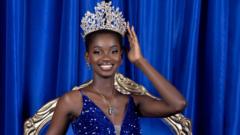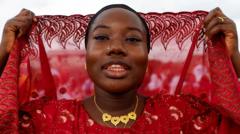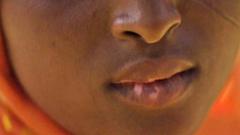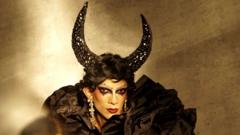Beauty pageants in Ivory Coast are undergoing a transformation as new rules prohibit wigs and extensions, focusing on natural hair and challenging traditional beauty standards.
Natural Beauty Takes the Spotlight in Ivorian Pageants

Natural Beauty Takes the Spotlight in Ivorian Pageants
New regulations ban wigs and extensions in a move to celebrate natural hair among contestants in Miss Ivory Coast.
Long assumed to be a staple of beauty pageants in Ivory Coast, wigs and weave extensions are now facing significant restrictions as the Miss Ivory Coast competition enforces new rules prioritizing natural beauty. With only two winners in over sixty years sporting their crowns with natural hair, Marlène-Kany Kouassi’s recent success as Miss Ivory Coast in 2022 has sparked a wave of change, encouraging contestants to embrace their authentic selves.
In an unprecedented move, the organizing committee of the Miss Ivory Coast pageant has made the bold decision to ban wigs and hair extensions during preliminary stages held across 13 cities, as well as for contestants in the diaspora. Victor Yapobi, president of the event, emphasized the need to showcase “raw beauty,” encouraging candidates to present themselves as they truly are—whether in braids or naturally styled hair.
Changes in the competition’s criteria extend beyond hair, with adjustments including the acceptance of contestants below 1.67 meters in height and raising the age limit to 28 years, while also reducing the entry fee to make participation more accessible financially. Many contestants welcomed the new rules, expressing newfound confidence and pride in their natural appearance.
While the initiative aims to redefine beauty standards and support the celebration of natural African aesthetics, the ban has ignited a debate across the country. Many women have embraced wigs not only as a fashion choice but also as versatile options that allow for personal expression. Contestants like Mak-up artist Astrid Menekou, initially surprised by the stipulation, have eventually come to appreciate their own hair in the absence of wigs.
As beauty pageants in Ivory Coast navigate this shift, they do not exist in a vacuum. The implications of the rule extend to the broader hair industry, which is valued at over $300 million dollars in the country, raising concerns among salon owners and hairdressers who rely on the business generated by wigs and extensions.
The new regulations are poised to change the traditional perception of beauty not only within the realm of pageants but also in society at large. Many women sharing their testimonials echo sentiments of empowerment as they shed artificial enhancements, with hopes that this movement may herald a new era of acceptance and diversity in beauty standards across the nation.
While the rules will apply to preliminary rounds, it remains to be seen if the final contestants of Miss Ivory Coast 2025 will continue under the same regulations. The ongoing feedback has been overwhelmingly positive, and Yapobi hints that this may signal the start of a powerful trend towards celebrating natural beauty.

















